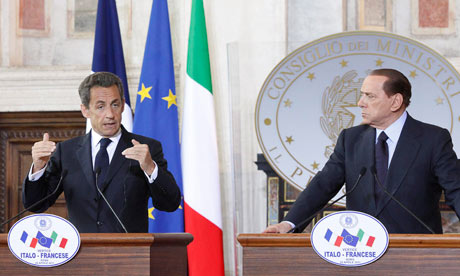
Sarkozy and Berlusconi are demanding European deportation pacts with the countries of revolutionary north Africa to send migrants home.
Sarkozy and Berlusconi want passport-free travel within the EU suspended as north African migrants flee north.
France and Italy have thrown down the gauntlet over Europe’s system of passport-free travel, saying a crisis of immigration sparked by the Arab spring was calling into question the borderless regime enjoyed by more than 400 million people in 25 countries.
Challenging one of the biggest achievements of European integration of recent decades, Nicolas Sarkozy and Silvio Berlusconi also launched a joint effort to stem immigration and demanded European deportation pacts with the countries of revolutionary north Africa to send new arrivals packing.
The French president and the Italian prime minister, at a summit in Rome, opted to pile the pressure on Brussels and the governments of the other 25 EU states, demanding an “in-depth revision” of European law regulating the passport-free travel that takes in almost all of the EU with the exception of Britain and Ireland.
Prompted by the influx to Italy of almost 30,000 immigrants, mainly from Tunisia, in recent months, the two leaders warned that the upheavals in north Africa “could swiftly become an out-and-out crisis capable of undermining the trust our fellow citizens place in the free circulation within the Schengen area”.
The passport-free travel system known as the Schengen regime was agreed by a handful of countries in 1985 and put into practice in 1995. Since then it has been embraced by 22 EU countries as well as Norway, Switzerland and Iceland, but spurned by Britain and Ireland. It is widely seen, along with the euro single currency, as Europe’s signature unification project of recent decades.
But like the euro, fighting its biggest crisis over the past year, the Schengen regime is being tested amid mounting populism and the renationalisation of politics across the EU.
In other setbacks to borderless Europe, Germany, France and other countries have been blocking the admission of Bulgaria and Romania to Schengen in recent months, while the arrival of thousands of Middle Eastern migrants in Greece has fed exasperation with Athens’s inability to control the EU’s southern border.
The Franco-Italian move, following weeks of bad-tempered exchanges between Paris and Rome over how to deal with the Tunisian influx, is the biggest threat yet to the Schengen regime.
“For the treaty to stay alive, it must be reformed,” Sarkozy said. Berlusconi added: “We both believe that in exceptional circumstances there should be variations to the Schengen treaty.”
They sent a joint letter to the European commission and European council chiefs, José Manuel Barroso and Herman Van Rompuy, urging proposals from Brussels and agreement on a new system at an EU summit of government heads in June.
The commission said it was drawing up new proposals, tinkering with the current system, to be unveiled next week. But it has resisted, with the support of most EU governments, intense Italian pressure to label the arrivals from north Africa an emergency.
Under European law the border-free regime can be suspended only for reasons of national security, routinely invoked in recent years by member states hosting major international sporting events such as the World Cup or the European football championships, where individual countries contend with a huge, one-off influx of foreigners.
Sarkozy and Berlusconi insisted the rules be changed to allow more restrictions on freedom of travel. A new deal was “indispensable”, they said. The June summit should “examine the possibility of temporarily re-establishing internal frontier controls in case of exceptional difficulty in the management of the [EU's] common external frontiers”.
This, however, would clearly not be in the interests of Italy, which fears an end to the hostilities in Libya could spark an even bigger exodus. In that event, the letter said, the EU should provide “mechanisms of specific solidarity” including the distribution of immigrants among member states.
This will prove extremely divisive and will be rejected by countries such as Germany and Sweden, which have much higher numbers of asylum seekers than Italy, less restrictive immigration policies, and little sympathy for Italy’s plight.
The concerted Franco-Italian initiative also called for accords between the EU and north African countries on repatriating immigrants, a policy certain to spark outrage among human rights groups, the refugee lobby, and more liberal EU governments.
Promising strong support for the democratic revolutions sweeping the Maghreb and the Middle East, Sarkozy and Berlusconi added: “In exchange we have the right to expect from our partner countries a commitment to a rapid and efficacious co-operation with the European Union and its member states in fighting illegal immigration.”
Tuesday’s move followed weeks of feuding between Rome and Paris over the Tunisian exodus. Furious at the failure of other EU countries to “share the burden”, the Italians granted visas to the immigrants enabling them to move elsewhere in the EU. The Germans and the Austrians complained. The Belgians accused Rome of “cheating” on the Schengen rulebook. The French government promptly closed a part of the border with Italy briefly, re-erecting passport controls to halt trains.
But Berlusconi and Sarkozy, seeking to curry favour with the strong far-right constituencies in both countries, sought to bury their differences by urging the rest of Europe to buy into their anti-immigration agenda.
http://feedproxy.google.com/~r/TheEuropeanUnionTimes/~3/sC-z2OIJS6Q/
No comments:
Post a Comment
Note: only a member of this blog may post a comment.